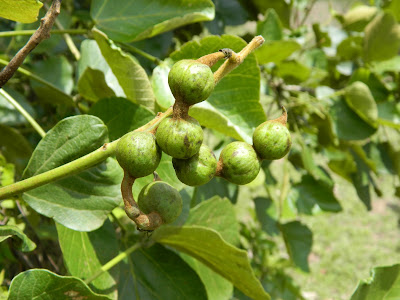I am not sure Dr. Seuss visited Africa before writing and illustrating The Lorax, but if he had, he would have seen his fictional truffula trees. The umuko, as it is called in Kinyarwanda, or Erythrina abyssinica, lights up the hillsides of Rwanda.
Umuko trees are native to Rwanda; they are a widespread species throughout savannas of sub-Saharan Africa. I have noticed that the flowers often appear after leaves have fallen from that branch (and before new leaves emerge).
Umuko flowers are pollinated by nectar-seeking birds like the bronzy sunbird (Nectarinia kilimensis) (center in the above picture).
Pollinated umuko flowers produce seedpods that eventually pop open to reveal the seeds.
The seeds are spread by fruit-eating birds.
Agahozo-Shalom Youth Village has more than 30 umuko trees throughout our property. The largest individual is the nature park, and another 20 small umuko trees can be found inside Parike Y'Umutungo Kamere W'Agahozo. Students work to clear invasive Lantana inside the park so that native trees like umuko can thrive. After all, truffula, I mean UMUKO trees "are what everyone needs!"
Works consulted:
- Dr. Seuss. The Lorax. Random House, 1971.
- "Erythrina abyssinica." AgroForestryTree Database. World Agroforestry Center. Accessed October 31, 2011 at http://www.worldagroforestrycentre.org/sea/Products/AFDbases/AF/asp/SpeciesInfo.asp?SpID=738







I came about this blog when I was searching for the English translation of "UMUKO". Good job! By the way thorns are called AMAHWA not "amotwa"in Kinyarwanda.
ReplyDeleteThanks for your appreciation of Rwandan flora and fauna
Thanks Jean claude Dusabe for the correct spelling. Hope you are enjoying these trees too!
ReplyDeleteI came about this site looking for African flowering trees. Thank you for the information about Dr Seuss and the truffula tree. I write and illustrate kid's stories set in Uganda and these trees are lovely to illustrate. I have also written non-fiction, set near Kisoro where Kinyarwanda is spoken,and could not find much information on the language.I work in Portugal and Umoko looks like a bottle brush, whichI have seen in Kampala. Are Umukos a relative?
Delete